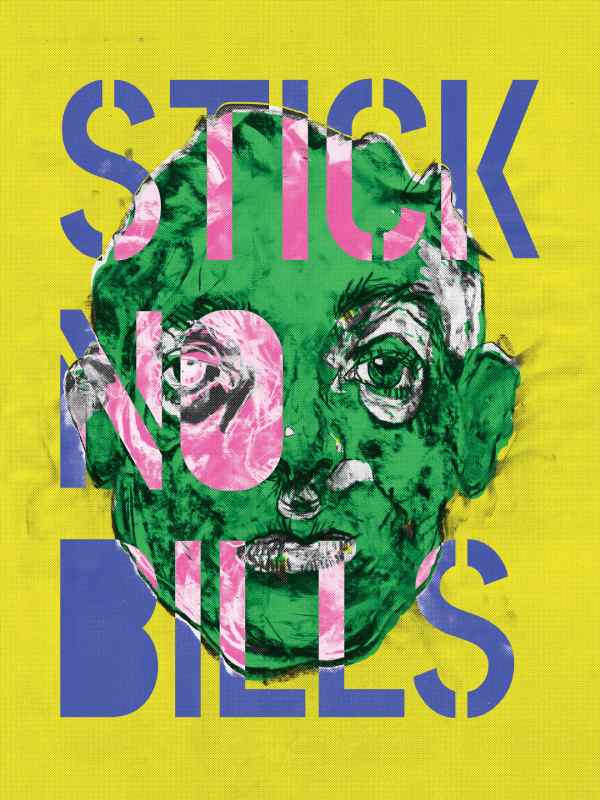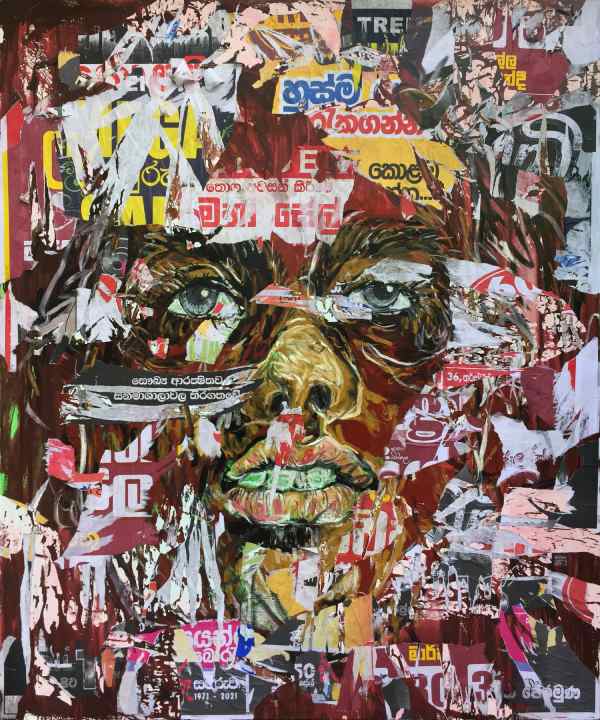Friday Feb 13, 2026
Friday Feb 13, 2026
Sunday, 13 March 2022 09:19 - - {{hitsCtrl.values.hits}}

by Hashan Cooray
In Stick No Bills, Hashan Cooray’s latest body of work, he focuses on a selection of posters stripped from the public walls of Colombo. The sourced images, taken from their original posts, illustrate a critical mixture of politics, consumerism and social critique and eventually make their way to his digital and painted canvases. Here, they move from one type of public display to another, filtered through Hashan’s discerning gaze as they become interwoven with the pigments of his iconic portraiture work.
Artists have a responsibility in spreading their concepts into the public sphere. These ideas, in turn, may be reviewed by a critical audience, as they could be dishonest or inadequate. However, when it comes to public identity, the vast output of culture and politics leaves little choice but for a relentless cacophony of voices to be discharged into everyday life. The posters in question are often layered upon each other over days and weeks, to be slowly - but not wholly - disintegrated over time by the humid climate of Sri Lanka. Nevertheless, these weathered façades provide a rich visual feast for the eyes and mind as fragmented images and words overlap one another, with each element vying for attention in the no man’s land of public space.
Travelling during the night on resource-gathering skirmishes, Hashan tears off these posters from the walls that form the city. He takes images and text and adds them to his oeuvre of materials. Through a series of canvases, poster prints and video art, Stick No Bills presents the artist’s experience of navigating the worlds of commercial advertising, political propaganda and social critique by contrasting media headlines with a set of vibrant colour palettes that also reflect the traditional CMYK colour printing sequences of modern print media. Underlying these technical aspects lies the necessity of exploring the impact that excessive multimedia propaganda has on the psyche of an individual. Themes of deception, power and violence are investigated and repurposed as the artist replicates the printed forms in the context of his studio. These new samples aim to give the taste of power back to the viewer, who all too often has no choice but to absorb ideas about identity, community and society, their tones ranging from corrupt manipulation to the bitter truth.
Hashan presents these works in the silent, contemplative space of the art gallery, in total contrast to the clamorous places they initially abide in. The exhibition, reflecting his creative process, is a meditation among the flurries of thought embodying the constant stream of consciousness that makes up urban life. Using portraiture as a medium to reflect these particular materials can be seen as an attempt to balance the idea of strength through identity with the underlying violence inherent in its desire to do so. Images are glued to a wall, only to be removed and then replaced; as the cycle repeats itself, neurosis is revealed as the psychologies that we are forced to contend with appear to be trapped in a perpetual state of distress and unrest. Stick No Bills engages with political critique and social upheaval as the artist translates an irrepressible sensory experience: a dissection of political messaging and the hypocrisy that barely lies beneath the surface and threatens to overflow at a moment’s notice. Hashan’s selection of poster material includes headlines and bodies of text that question passed laws and failed policies that include education, labour, the environment, poverty, militarisation and misconduct. In addition, the unbearable necessities of life and dignity are held in contrast to the indifferent demands of consumerist culture. The exhibition explores how these factors all partake in the waves of noise that permeate the collective consciousness, as each attempt to define and determine the Sri Lankan identity. As a result, the underlying bloodlust of this island is laid bare in the scraping away of these posters that are reminiscent of the frenzied throes of a wild animal. What kind of legacy are we leaving behind? We risk that the history we write will be constantly overwritten and replaced in this process.
While it appears that no singular voice may triumph, it seems that our society needs a consistent commonality to emerge that will take us through the disorder into something more peaceful. Hashan isolates and reshapes the messy textures that simultaneously suppress and promote the plethora of voices that inhabit the cityscape into something contemplative. Using an almost vigilante method of repurposing the oppressive communications of capital and government, he raises the possibility of moving towards a state of equilibrium. By embracing the confusion they provide, Hashan presents a truthful vision of the reality of what it is doing to us as a society and individuals. While it may be overwhelming, the chaos can be an insightful experience, for the vibrant absurdity may provide the answers to our questions. What matters is how we take steps to approach and encounter it - from a quiet, meditative and contemplative space reminiscent of the artist’s way of making, being, and looking at the world.
Born in Colombo, Sri Lanka in 1987. Hashan Cooray pursued a career as a visual artist via unconventional means of both self-learning, courses in fine art and his experience as an Art Director in the advertising industry. Hashan Cooray has presented his work in group and solo exhibitions George Keyt Foundation (2010, 2017), Imago Mundi Publication (2016), Lab Rats, Art Space Sri Lanka (2017), Parahumans, SGG (2019), Nawakalakaruwo, JDA Perera Gallery (2019) and Desire, SFG (2020). He is currently Art Director of. Phoenix Ogilvy Sri Lanka. His works belong to private collections in Sri Lanka, Spain, USA, New Zealand and India.
Image 1: Hashan Cooray, Stick No Bills XIV, 2022, Print on Archival Paper, 60cm x 45cm
Image 2: Hashan Cooray, Stick No Bills 4, 2022, Mixed Media on Canvas, 187cm x 156cm
Hashan Cooray’s exhibition will be on display to the public at Saskia Fernando Gallery.
No. 41, Horton Place, Colombo 7. Open 10am to 6pm.
Contact Tel 0117429010 or email [email protected] for further information.
